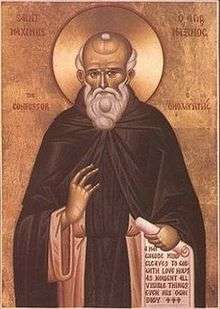February 13 (Eastern Orthodox liturgics)
February 12 - Eastern Orthodox liturgical calendar - February 14
All fixed commemorations below are observed on February 26 by Eastern Orthodox Churches on the Old Calendar.[note 1]
For February 13th, Orthodox Churches on the Old Calendar commemorate the Saints listed on January 31.
Saints
- Apostles and martyrs Aquila and his wife Priscilla (1st century)[1][2][3][4][note 2] (see also: July 8, July 14)
- Holy Two Martyrs, father and son, by crucifixion.[5]
- Saint Timothy, Archbishop of Alexandria (385)[1][4][6]
- Venerable Martinian of Caesarea in [[Palestine (region)|Palestine] (5th century)[1][3][7][8]
- Venerable Zoe of Bethlehem, and the Virgin Photini (5th century)[1][4][6][9]
- Venerable Eulogius of Alexandria, Patriarch of Alexandria (608)[1][3][10][11]
- Righteous Martin the Merciful.[4][6]
Pre-Schism Western saints
- Martyrs Fusca and Maura, two martyrs in Ravenna under Decius (c. 250)[12][13][note 3]
- Saint Julian of Lyons, a martyr venerated in Lyons in France.[12][14]
- Saint Benignus of Todi, a priest in Todi in Umbria in Italy martyred under Diocletian (c. 303)[12][14]
- Saint Castor of Karden, hieromonk and missionary in Germany (c. 400)[1][6][15]
- Saint Stephen of Lyons, Bishop of Lyons in France, he was active in converting the Arian Burgundians to Orthodoxy, Confessor (512)[12][14]
- Saint Modomnoc, Bishop of Ossory in Ireland (c. 550)[1][6][12][16][17][18][note 4]
- Saint Stephen of Rieti, an Abbot in Rieti in Italy whom St Gregory the Great describes as 'rude of speech but of cultured life' (c. 590)[12][note 5]
- Saint Licinius of Angers (Lezin), Bishop of Angers in France (c. 618)[12][14]
- Saint Huna of Thorney, priest-monk of Huneia (c. 690)[6][12][16][note 6]
- Saint Dyfnog, born in Wales, he was much venerated in Clwyd (7th century)[12]
- Saint Ermenilda of Ely (Ermengild, Ermenilda), Abbess of Ely (c. 700)[6][12][16][19]
- Saint Aimo (Aimonius), founder of the convent of St Victor in Meda in the north of Italy (c. 790)[12]
- Saint Gosbert, fourth Bishop of Osnabruck in Germany and a disciple of St Ansgar (c. 859)[12]
- Saint Fulcran, Bishop of Lodève in Languedoc in France, famous for his asceticism, he was bishop for over half a century (1006)[12][20]
Post-Schism Orthodox saints
- Venerable Symeon the Myrrh-gusher (Stefan Nemanja), Grand Prince of Serbia (1200)[1][3][21][22][note 7]
- Saint Joseph of Volokolamsk, founder of Volokolamsk (Volotsk) Monastery (1515)[1][4][6]
- Saint George Konnissky (Yurij Konissky), Archbishop of Mogilev in Belorussia (1795)[1][23][24]
- Saint Seraphim (Sobolev), Archbishop of Bogucharsk and Wonderworker of Sofia (1950)[1][25][26][27][note 8]
New martyrs and confessors
- New Hieromartyrs Basil Triumfov and Gabriel Preobrazhensky, Priests (1919)[6][28]
- New Hieromartyr Sylvester (Olshevsky), Archbishop of Omsk and Pavlodar (1920)[4][6][28][note 9] (Feast moved to February 25)
- New Hieromartyrs Leontius Grimalsky, Archpriest, of Gzhel, Moscow, and Zosima Trubachev,[note 10] Archpriest, of Maloyaroslavets (1938)[1][6][28]
- New Hieromartyrs (1938):[6][28]
Other commemorations
- Consecration of the Church of the Theotokos and Saint Thekla, on Mount Posaleos.[29]
- Translation of the relics (980 and 981) of Saint Edward the Martyr, King of England (978)[6][note 12] (see also: June 20 - uncovering, and March 18 - feast)
- Icon of the Theotokos 'Dolinsky'.[4]
- Synaxis of the Saints of Omsk.[1]
- Repose of Abbess Seraphima of Sezenovo (1877)[1][31]
Icon gallery
.jpg) Martyrdom of Apostle Aquila.
Martyrdom of Apostle Aquila..jpg) Venerable Eulogius of Alexandria.
Venerable Eulogius of Alexandria.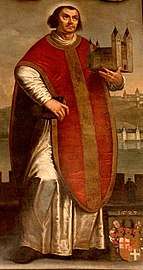
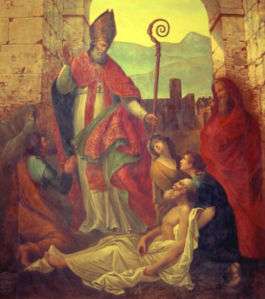 St Fulcran, Bishop of Lodève.
St Fulcran, Bishop of Lodève.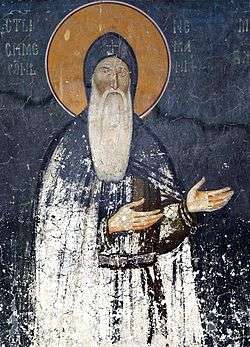 Venerable Symeon the Myrrh-gusher.
Venerable Symeon the Myrrh-gusher.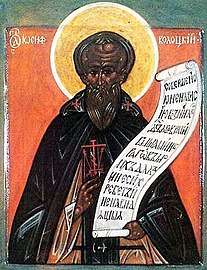 St Joseph of Volokolamsk.
St Joseph of Volokolamsk..jpg) St Seraphim (Sobolev), Abp. of Bogucharsk and Wonderworker of Sofia.
St Seraphim (Sobolev), Abp. of Bogucharsk and Wonderworker of Sofia.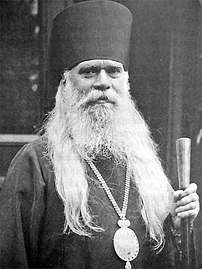 St Seraphim (Sobolev), Abp. of Bogucharsk and Wonderworker of Sofia.
St Seraphim (Sobolev), Abp. of Bogucharsk and Wonderworker of Sofia. The Shrine of St Edward in the Church of St. Edward the Martyr, Brookwood.
The Shrine of St Edward in the Church of St. Edward the Martyr, Brookwood.
Notes
- The notation Old Style or (OS) is sometimes used to indicate a date in the Julian Calendar (which is used by churches on the "Old Calendar").
The notation New Style or (NS), indicates a date in the Revised Julian calendar (which is used by churches on the "New Calendar"). - Name days celebrated today include:
- Aquila (Ἀκύλας).
- "At Ravenna, in the time of the emperor Decius, and the governor Quinctian, the Saints Fusca, virgin, and her nurse, Maura, who endured many afflictions, were transpierced with a sword, and thus ended their martyrdom."[14]
- A disciple of St David in Wales and later a hermit in Tibraghny in Ireland.
- "At Rieti, the abbot St. Stephen, a man of wonderful patience, at whose death, as is related by the blessed pope Gregory, the holy angels were present and visible to all."[14]
- A monk-priest in Ely in England under St Audrey (Etheldred) whom he helped in her last moments. He ended his life as a hermit in the fens near Chatteris, at a place now called Honey Farm after him.
- His relics were transferred to the Studenica monastery in 1208.
- See: (in Russian) Серафим (Соболев). Википедии. (Russian Wikipedia).
- (in Russian) память его перенесена с 26 февраля на 10 марта (9 марта в високосном году).
- See: (in Russian) Трубачёв, Зосима Васильевич. Википедии. (Russian Wikipedia).
- See: (in Russian) Горбачёв, Василий Григорьевич. Википедии. (Russian Wikipedia).
- Note the following historical dates and feast days:
- The first translation of the holy relics, to the church of the Most Holy Mother of God in Wareham, took place on February 13, 980.[30]
- On February 13, 981 a great procession of clergy and laity translated the relics to Shaftesbury Abbey, arriving there seven days later, on February 20.[30]
- The elevation (uncovering) of the relics of St. Edward took place on June 20, 1001.[30]
- St. Edward was officially glorified by an act of the All-English Council of 1008, presided over by St. Alphege, Archbishop of Canterbury (who was martyred by the Danes in 1012). King Ethelred ordered that the saint's three feast days — March 18, February 13 and June 20 — should be celebrated throughout England.[30]
gollark: Pibblepabble?
gollark: Wait, that wouldn't work.
gollark: Altitude?
gollark: Maybe gusties are... alti-something?
gollark: But yay, pygmies! And cool eggos.
References
- February 13 / 26. Orthodox Calendar (Pravoslavie.ru).
- Great Synaxaristes: (in Greek) Οἱ Ἅγιοι Ἀκύλας καὶ Πρίσκιλλα οἱ Ἀπόστολοι. 13 Φεβρουαρίου. Μεγασ Συναξαριστησ.
- (in Greek) Συναξαριστής. 13 Φεβρουαρίου. Ecclesia.gr. (H Εκκλησια Τησ Ελλαδοσ).
- The Autonomous Orthodox Metropolia of Western Europe and the Americas. St. Hilarion Calendar of Saints for the year of our Lord 2004. St. Hilarion Press (Austin, TX). pp. 14-15.
- Great Synaxaristes: (in Greek) Οἱ Ἅγιοι Πατὴρ καὶ Υἱὸς οἱ Μάρτυρες. 13 Φεβρουαρίου. Μεγασ Συναξαριστησ.
- February 26 / 13. Holy Trinity Russian Orthodox Church (A parish of the Patriarchate of Moscow).
- Great Synaxaristes: (in Greek) Ὁ Ἅγιος Μαρτινιανός. 13 Φεβρουαρίου. Μεγασ Συναξαριστησ.
- Venerable Martinian of Caesarea, in Palestine. OCA - Lives of the Saints.
- St Zoe. OCA - Lives of the Saints.
- Great Synaxaristes: (in Greek) Ὁ Ὅσιος Εὐλόγιος Ἀρχιεπίσκοπος Ἀλεξάνδρειας. 13 Φεβρουαρίου. Μεγασ Συναξαριστησ.
- St Eulogius the Archbishop of Alexandria. OCA - Lives of the Saints.
- February 13. Latin Saints of the Orthodox Patriarchate of Rome.
- Rev. Sabine Baring-Gould (M.A.). "SS. Fusca and Maura, MM. (3rd Cent.)." In: The Lives of the Saints. Volume the Second: February. London: John C. Nimmo, 1897. pp. 286-287.
- The Roman Martyrology. Transl. by the Archbishop of Baltimore. Last Edition, According to the Copy Printed at Rome in 1914. Revised Edition, with the Imprimatur of His Eminence Cardinal Gibbons. Baltimore: John Murphy Company, 1916. pp. 46–47.
- Rev. Sabine Baring-Gould (M.A.). "S. Castor, P. C. (end of 4th century.)." In: The Lives of the Saints. Volume the Second: February. London: John C. Nimmo, 1897. p. 289.
- Rev. Richard Stanton. A Menology of England and Wales, or, Brief Memorials of the Ancient British and English Saints Arranged According to the Calendar, Together with the Martyrs of the 16th and 17th Centuries. London: Burns & Oates, 1892. pp. 66–68.
- Very Rev. John O'Hanlon. "Article I. — St. Domnoc, Dominicus or Modomnoc, Patron of Tibberaghny, and Fiddown, Coutny Kilkenny. [Sixth Century.]." In: Lives of the Irish Saints: With Special Festivals, and the Commemorations of Holy Persons. Vol. II. Dublin, 1875. pp. 510-516.
- Rev. Sabine Baring-Gould (M.A.). "S. Modomnoc, C. (6th Cent.)." In: The Lives of the Saints. Volume the Second: February. London: John C. Nimmo, 1897. p. 291.
- Rev. Sabine Baring-Gould (M.A.). "S. Ermenilda, Q. Abss. (about A.D. 700.)." In: The Lives of the Saints. Volume the Second: February. London: John C. Nimmo, 1897. pp. 292-293.
- Rev. Sabine Baring-Gould (M.A.). "S. Fulcran, B. C. (A.D. 1006.)." In: The Lives of the Saints. Volume the Second: February. London: John C. Nimmo, 1897. pp. 294-295.
- Great Synaxaristes: (in Greek) Ὁ Ὅσιος Συμεὼν ὁ Μυροβλήτης Κτήτορας τῆς Μονῆς Χιλανδαρίου Ἁγίου Ὄρους. 13 Φεβρουαρίου. Μεγασ Συναξαριστησ.
- Venerable Stephen (In Monasticism Simeon), the Myrrhgusher and Prince of Serbia. OCA - Lives of the Saints.
- Great Synaxaristes: (in Greek) Ὁ Ἅγιος Γεώργιος Ἀρχιεπίσκοπος Λευκορωσίας. 13 Φεβρουαρίου. Μεγασ Συναξαριστησ.
- The Thirteenth Day of the Month of February. Orthodoxy in China.
- (in Bulgarian) Деяние На Архиерейския Събор На Рпҵ И Св. Синод На Бпц-Бп За Канонизацията На Св. Серафим Софийски Чудотворец. Българска Патриаршия. 05 февруари 2016 16:25.
- (in Russian) 13 февраля по старому стилю / 26 февраля по новому стилю. Русская Православная Церковь - Православный церковный календарь на 2017 год.
- Schemanun Seraphima (Transl.). Saint Seraphim of Sofia: His Life, Teachings, Miracles, and Glorification. Convent of the Protection of the Holy Theotokos (Comp.). Center for Traditionalist Orthodox Studies, 2008. ISBN 978-0-911165-67-8.
- (in Russian) 13 февраля по старому стилю / 26 февраля по новому стилю. СПЖ "Союз православных журналистов". 2018.
- Great Synaxaristes: (in Greek) Ἐγκαίνια Ἱεροῦ Ναοῦ τῆς Θεοτόκου καὶ τῆς Ἁγίας Θέκλας ἐν τῷ ὄρει Ποσαλέως. 13 Φεβρουαρίου. Μεγασ Συναξαριστησ.
- St. Edward the Martyr, King of England. St. Nicholas Russian Orthodox Church, McKinney (Dallas area) Texas.
- Great Synaxaristes: (in Greek) Ἡ Ὁσία Σεραφείμα ἐκ Ρωσίας. 13 Φεβρουαρίου. Μεγασ Συναξαριστησ.
Sources
- February 13 / 26. Orthodox Calendar (Pravoslavie.ru).
- February 26 / 13. Holy Trinity Russian Orthodox Church (A parish of the Patriarchate of Moscow).
- February 13. OCA - The Lives of the Saints.
- The Autonomous Orthodox Metropolia of Western Europe and the Americas. St. Hilarion Calendar of Saints for the year of our Lord 2004. St. Hilarion Press (Austin, TX). pp. 14-15.
- The Thirteenth Day of the Month of February. Orthodoxy in China.
- February 13. Latin Saints of the Orthodox Patriarchate of Rome.
- The Roman Martyrology. Transl. by the Archbishop of Baltimore. Last Edition, According to the Copy Printed at Rome in 1914. Revised Edition, with the Imprimatur of His Eminence Cardinal Gibbons. Baltimore: John Murphy Company, 1916. pp. 46–47.
- Rev. Richard Stanton. A Menology of England and Wales, or, Brief Memorials of the Ancient British and English Saints Arranged According to the Calendar, Together with the Martyrs of the 16th and 17th Centuries. London: Burns & Oates, 1892. pp. 66–68.
- Greek Sources
- Great Synaxaristes: (in Greek) 13 Φεβρουαριου. Μεγασ Συναξαριστησ.
- (in Greek) Συναξαριστής. 13 Φεβρουαρίου. Ecclesia.gr. (H Εκκλησια Τησ Ελλαδοσ).
- Russian Sources
- (in Russian) 26 февраля (13 февраля). Православная Энциклопедия под редакцией Патриарха Московского и всея Руси Кирилла (электронная версия). (Orthodox Encyclopedia - Pravenc.ru).
- (in Russian) 13 февраля по старому стилю / 26 февраля по новому стилю. СПЖ "Союз православных журналистов". 2018.
This article is issued from Wikipedia. The text is licensed under Creative Commons - Attribution - Sharealike. Additional terms may apply for the media files.

